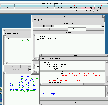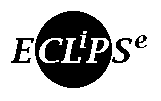
|
This release contains the first version of the tkeclipse
Development Environment for Unix and Windows.
It consists of an interface to the ECLiPSe top-level and
a set of GUI-based development tools.
These include a program tracer, a term inspector, file and predicate
browsers, hypertext help and various other facilities. They have all
been developed using the new ECLiPSe/Tcl interface described below.
The development tools can be also be used in user applications that
make use of this new Tcl interface.
|

